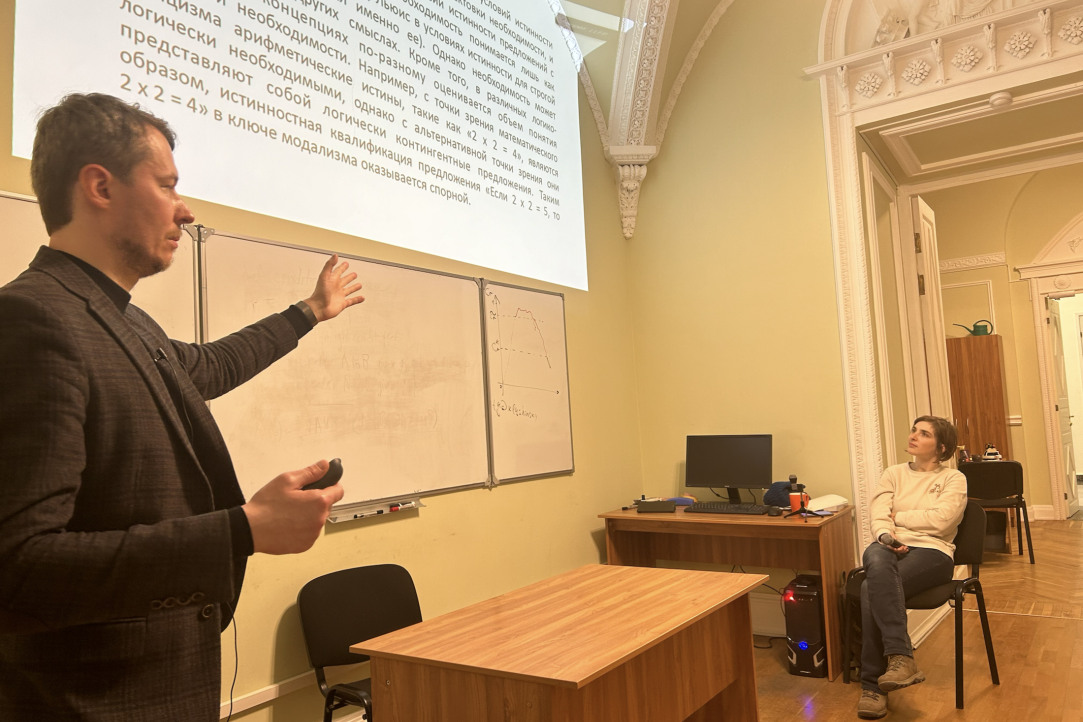A presentation - discussion made by Anna Moiseeva and Mikhail Smirnov on the topic "Situational Semantics for Natural Reasoning"
On January 26 and February 2 participants of "Formal Philosophy-81" workshop met to listen to Anna Moiseeva and Mikhail Smirnov who spoke in the format of a discussion paper on the topic "Situational Semantics for Natural Reasoning".
Part 1 "Relevance and logical following from a situational semantics point of view''
Abstract
One of the central trends in modern logical research is an active appeal to natural reasoning. Their constitutive principles and features are often contrasted with those principles that are known today as classical logic. The latter include extensionality, logical bivalence, understanding of truth values as denotations of descriptive sentences, correlation with natural language syncategoremata of a certain set of truth-functional logical connectives (in particular, material implication as an analogue of conditional structures in natural reasoning), classical understanding of logical consequence, "logical explosion" (trivialization in the presence of any contradiction). The adequacy of all these features of classical logic to the tasks of modeling and analyzing natural reasoning is being questioned today. For example, it is argued that natural reasoning is characterized by a relevant relationship between the components of conditional structures. The classical material implication does not provide the desired relevance. Due to this fact, the task is to determine the relevant implication and change the understanding of logical consequence. Approaches to solving such problems involve the employment of semantic tools that go beyond the standard set-theoretic semantics. One of these non-standard tools is situational semantics. In addition to the applications mentioned above, it is used as an alternative to the semantics of possible worlds for modelled reasoning. In our presentation, first of all, we will consider in more detail the above-mentioned motives for referring to situational semantics. Secondly, we will describe how it can be used for these purposes. Thirdly, we will argue about the logical and philosophical consistency and prospects of the above-mentioned trends.
Part 2 "Modeling of Epistemic Aspects of Modalities by Means of Situational Semantics"
Abstract
Anyone who has studied modal logic knows that there is a so-called alethic reading of the modalities of possibility and necessity, which usually compares them with logical or metaphysical possibility and necessity; and there are epistemic and doxastic logics where possibility is understood as acceptability in the epistemic or doxastic sense, respectively, and necessity as knowledge or belief, respectively. However, what if we try to look from an epistemic point of view at the words "possible" and "necessary" themselves, how do they function in natural reasoning? This approach seems justified, since often these words obviously have nothing to do with either logical or metaphysical possibility and necessity, they rather convey something that this particular agent considers possible or necessary in this particular context. This particular point of view on modalities will be adopted in our discussion. Using the tools of situational semantics, we will try to clarify what agents are appealing to when talking about possibility and necessity in one or another way, presumably, these epistemic aspects of modalities should be modeled. We will also touch upon the topics of the modal meaning of identity and its epistemology, the "fate" of objects known to the agent in counterfactual scenarios, the criteria for the likelihood of such scenarios and, in general, how free a fantasy can be so that a reasonable person "can believe in it".

